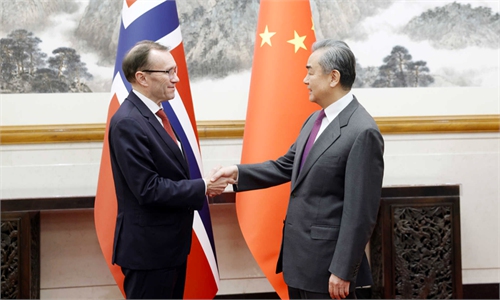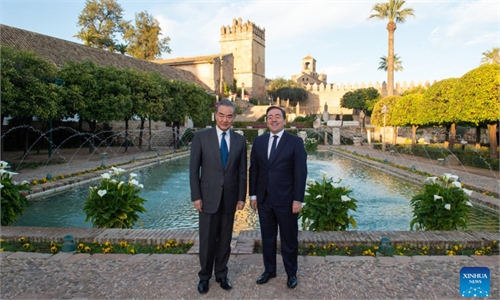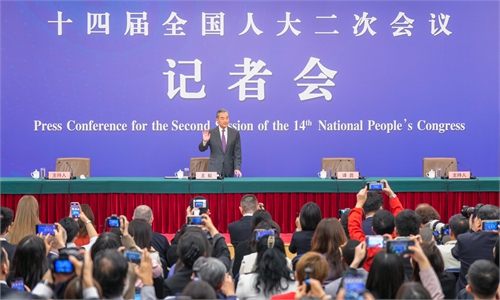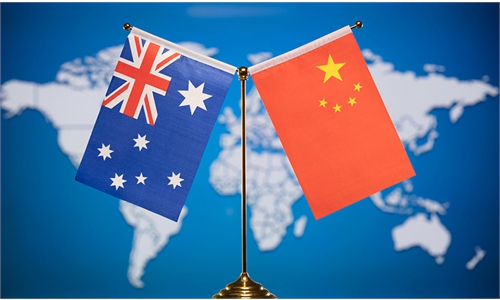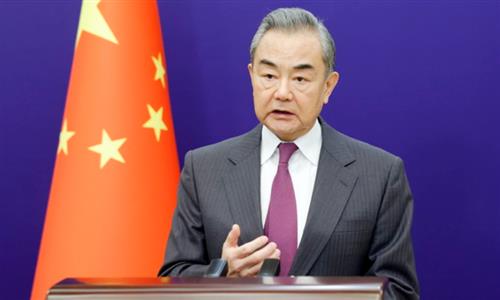China's diplomacy characterized as balance and inclusiveness, drawing sharp contrast to US-led bloc confrontation
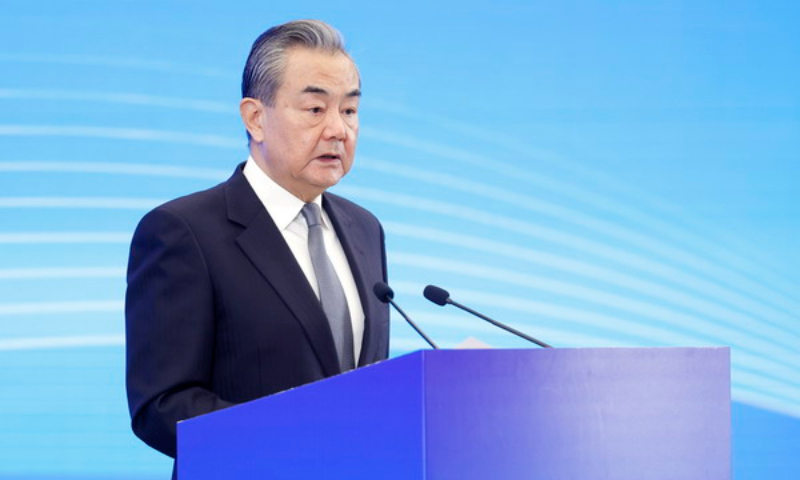
Chinese Foreign Minister Wang Yi. Photo: mfa.gov.cn
China's diplomacy enters a busy season, as China's interactions with Europe, the US, Russia, ASEAN member countries and the Global South are attracting global attention. The recent series of visits of foreign leaders and senior officials to China demonstrates that China's diplomacy, based on multilateralism, openness and cooperation, is increasingly being welcomed by the world, which also draws a sharp contrast to the US-led small clique advocating for bloc confrontation and conflicts, experts said.
President of Suriname Chandrikapersad Santokhi arrived in Beijing on Thursday for a seven-day state visit, becoming the latest foreign leader visiting the country this week.
Since April, senior foreign officials have been visiting China in quick succession, including Russian Foreign Minister Sergey Lavrov and US Secretary of the Treasury Janet Yellen, as well as high-ranking officials from ASEAN member countries such as Vietnam and Singapore.
There are also visits of leaders from small countries in terms of size and population like Micronesia and Suriname.
Also, German Chancellor Olaf Scholz is scheduled to travel to China this weekend, focusing on trade and economy, AFP reported. The US media reported recently that US Secretary of State Antony Blinken will also travel to China shortly.
Some Chinese experts said among those foreign heads of state and dignitaries, there are both traditional friendly neighbors and self-defined "competitors," as well as emerging and developing countries that have both industrial chain competition and cooperation.
Especially on Monday, Yellen and Lavrov were in Beijing at the same time, signaling that the solid China-Russia relations are advancing in tandem with China-US and China-Europe relations, which is hard-won balance from a geopolitical perspective, analysts said.
Openness and inclusiveness
It's clear that foreign friends visiting China come for various reasons. Some come to learn from China's development experience, some seek to deepen pragmatic cooperation between both sides, and others come to hear about China's solutions to various global issues. An open and cooperative China not only benefits its own people but also people around the world, Xinhua said.
"It's apparent that China's diplomatic efforts are quite active," Li Haidong, a professor at the China Foreign Affairs University, told the Global Times on Thursday.
China's diplomacy is clearly aimed at serving its own domestic overall development and addressing the need for building a global order of fairness and justice, the expert said, noting that China's involvement in and promotion of multilateral diplomatic efforts have also received widespread recognition and acknowledgment from various countries.
During a joint press conference with Lavrov on Tuesday, the Chinese Foreign Minister Wang Yi elaborated on China's stance and proposition on resolving current international and regional hotspot issues including upholding the purposes and principles of the UN Charter, actively promoting parties concerned to resolve conflicts through dialogue and consultation and upholding genuine multilateralism and opposing camp confrontation, especially in the Asia-Pacific region.
Chinese experts said the most significant characteristic of Chinese diplomacy this year has been its increased activity and more independent initiatives in promoting peace and facilitating talks to address hotspot issues.
On current hot topics, whether it be the Middle East, the Russia-Ukraine conflict, or various other issues, China has always maintained an independent stance in participating in the resolution of international and regional issues. This stance is determined independently based on the merits of each case, and actions are taken according to this stance, some experts said.
Sharp contrast to US-led small clique
April has also witnessed a host of high-level visits from Southeast Asian countries to China. Indonesian President-elect Prabowo Subianto's visit to China was the first leg of his first overseas visit as President-elect.
During the Qingming festival, Foreign Minister Wang also met with Lao Deputy Prime Minister and Foreign Minister Saleumxay Kommasith, Vietnamese Foreign Minister Bui Thanh Son, and Timor-Leste's Minister of Foreign Affairs and Cooperation Bendito dos Santos Freitas respectively in South China's Guangxi Zhuang Autonomous Region.
This week, Her Royal Highness Princess Maha Chakri Sirindhorn of Thailand, Vietnamese National Assembly Chairman Vuong Dinh Hue and Singaporean Deputy Prime Minister Heng Swee Keat are visiting China, according to the Chinese foreign ministry.
On the backdrop of easing China-US relations and rising global geopolitical and economic uncertainties, ASEAN member countries are looking forward to more stable and mutually beneficial relations with China, Chen Xiangmiao, director of the World Navy Research Center at the National Institute for South China Sea Studies, told the Global Times on Thursday.
"In engaging with other major powers outside the Southeast Asian region, the ASEAN member countries hope to play a role in the system that contributes to regional peace and stability and hope that they will not be marginalized, avoiding becoming cannon fodder in the competition among major powers," Chen said.
The goals advocated by ASEAN are in fact closely related and interconnected with China-proposed initiatives, which draw a stark contrast to the concepts, methods, and contents currently pursued by the US, Japan and the Philippines, the expert said.
As China is receiving more leaders and high-level officials from the ASEAN member countries, US President Joe Biden, Japanese Prime Minister Fumio Kishida and Philippine President Ferdinand R. Marcos Jr are scheduled to hold a trilateral summit in the US on Thursday amid rising tensions in the South China Sea.
The US-led small clique emphasizes small-group multilateralism that is inherently exclusionary, and their approach generates targeted, confrontational strategies to achieve their goals of power and interests, Chen said.
The so-called trilateral cooperation, echoing the US' diplomacy that is characterized as confrontational, could further heighten maritime risks and jeopardize regional stability in the South China Sea, experts said.
"The US' diplomacy is characterized by camp confrontation and group antagonism and it's designed such that if you're not with the US, you're against it, and being against it means the US considers you a target for attack," Li said.
This kind of diplomacy, which stirs up trouble, creates an atmosphere of forming cliques to attack others. And the Western countries, led by the US, force nations worldwide to take sides in regional conflicts, thereby aiming to enhance the geopolitical advantage of the West through conflict, the expert noted. "Countries that maintain a neutral stance and advocate for peace and dialogue are negatively portrayed in the narrative of the West."

